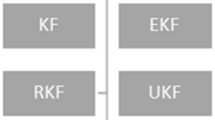Abstract
An important and hard problem in signal processing is the estimation of parameters in the presence of observation noise. In this paper, adaptive finite impulse response (FIR) filtering with noisy input-output data is considered and two developed bias compensation least squares (BCLS) methods are proposed. By introducing two auxiliary estimators, the forward output predictor and the backward output predictor are constructed respectively. By exploiting the statistical properties of the cross-correlation function between the least squares (LS) error and the forward/backward prediction error, the estimate of the input noise variance is obtained; the effect of the bias can thereafter be removed. Simulation results are presented to illustrate the good performances of the proposed algorithms.
Similar content being viewed by others
References
Ljung L. System Identification: Theory for the User. Englewood Cliffs: Prentice-Hall, 1987
Söderström T, Stoica P. System Identification. Hemel Hempstead: Prentice-Hall, 1989
Haykin S S. Adaptive Filter Theory. 2nd ed. Englewood Cliffs: Prentice-Hall, 1991.
Widrow B, Stearns S D. Adaptive Signal Processing. Englewood Cliffs: Prentice-Hall, 1989.
Diniz P S, Da Silva E A B, Netto S L. Digital Signal Processing: System Analysis and Design. Cambridge: Cambridge University Press, 2002
Kay S M. Fundamentals of Statistical Signal Processing: Estimation Theory. Englewood Cliffs: Prentice-Hall, 1993.
Proakis J G. Digital Communications. 4th ed. New York: McGraw Hill, 2001.
Golub G H, Van Loan C F. An analysis of the total least squares problem. SIAM Number Anal, 1980, 17): 883–893
Huffel S V, Vanderwalle J. The Total Least Squares Problem: Computational Aspects and Analysis. Philadelphia: SIAM, 1991
Ljung L, Morf M, Falconer D. Fast calculation of gain recursive algorithm for computing the TLS solution for matrices for recursive estimation schemes. Int J Contr, 1978, 27(1)): 1–19
Falconer D D, Ljung L. Application of fast Kalman estimation to adaptive equalization. IEEE Trans Commun, 1978, COM-26(10)): 1439–1446
Davila C E. An efficient recursive total least squares algorithm for FIR a daptive filtering. IEEE Trans Signal Process, 1994, 41(2)): 268–280
Gao K, Ahmad M O, Swamy M N S. A constrained anti-Hebbain learning algorithm for total least-squares estimation with applications to adaptive FIR and IIR filtering. IEEE Trans CAS-II, 1994, 41(11)): 718–729
Feng D Z, Bao Z, Jiao L C. Total least mean squares algorithm. IEEE Trans Signal Process, 1998, 46(8)): 2122–2130
Feng D Z, Zhang X D, Chang D X, et al. A fast recursive total least squares algorithm for adaptive FIR filtering. IEEE Trans Signal Process, 2004, 52(10)): 2729–2737
Feng D Z, Zheng W X. An adaptive algorithm for fast identification of FIR systems. In: Proceedings of IEEE International Symposium on Circuits and Systems. Washington: IEEE, 2006. 2333–2336
Feng D Z, Zheng W X. An efficient identification algorithm for FIR filtering with noisy data. In: Proceedings of IEEE International Symposium on Circuits and Systems. Washington: IEEE, 2007. 829–832
Davila C E. Line search algorithms for adaptive filtering. IEEE Trans Signal Process, 1993, 41(7)): 2490–2494
Feng D Z, Zhang X D, Bao Z. An efficient multistage decomposition approach for independent components. Signal Process, 2003, 83): 181–197
So H C. Modified LMS algorithm for unbiased impulse response estimation in non-stationary noise. Electron Lett, 1999, 35(10)): 791–792
Feng D Z, Bao Z, Zhang X D. Modified RLS algorithm for unbiased estimation of FIR system with input and output noise. Electron Lett, 2000, 36(3)): 273–274
Zheng W X. A least-squares based algorithm for FIR filtering with noisy data. In: Proceedings of the International Symposium on Circuits and Systems. Vol 4. Bankok: IEEE, 2003. 444–447
Jia L J, Jin C Z, Wada K. On bias compensated recursive least-squares algorithm for FIR adaptive filtering. In: Proceedings of IFAC Workshop on Adaptation and Learning in Control and Signal Processing. Como, 2001. 347–352
Jia L J, Jin C Z, Wada K. Bias compensated recursive leasts-quares algorithm for consistent parameter estimation for FIR system with input and output noise. In: Proceedings of ICEE International Conference on Electrical Engineering. Vol 3. Xi’an: 2001. 1498–1501
Sagara S, Wada K. On-line modified least-squares parameter estimation on linear discrete dynamic systems. Int J Contr, 1977, 25(3)): 329–343
Author information
Authors and Affiliations
Corresponding author
Additional information
Supported by the National Natural Science Foundation of China for Distinguished Young Scholars (Grant No. 60625104), the Ministerial Foundation of China (Grant No. A2220060039) and the Fundamental Research Foundation of BIT (Grant No. 1010050320810)
Rights and permissions
About this article
Cite this article
Jia, L., Tao, R., Wang, Y. et al. Forward/backward prediction solution for adaptive noisy FIR filtering. Sci. China Ser. F-Inf. Sci. 52, 1007–1014 (2009). https://doi.org/10.1007/s11432-009-0086-9
Received:
Accepted:
Published:
Issue Date:
DOI: https://doi.org/10.1007/s11432-009-0086-9




